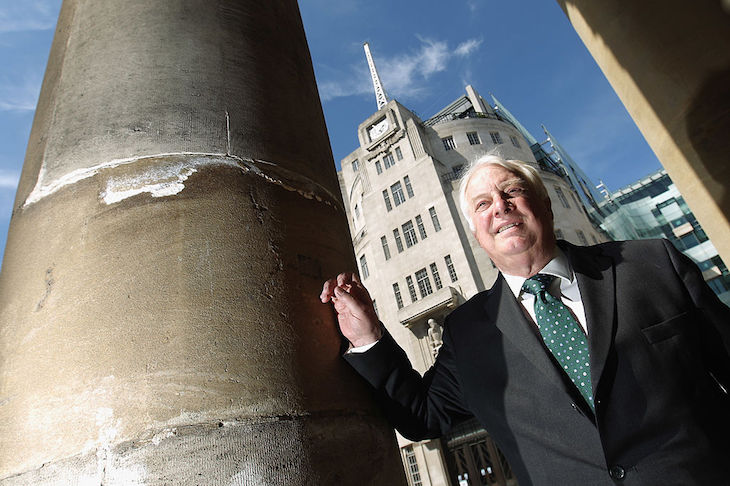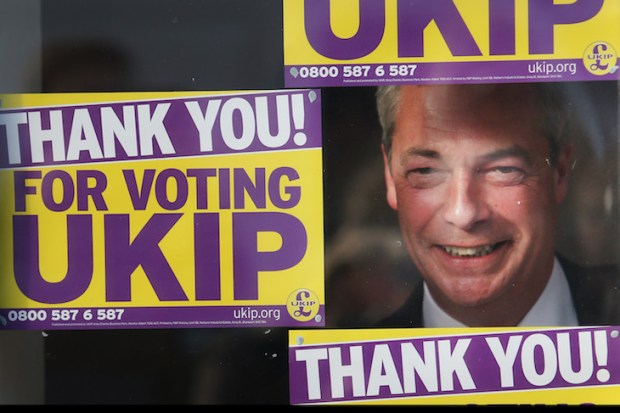‘Studying history at Balliol,’ writes Chris Patten, ‘I knew that the one thing which made me uneasy was a grand theory or over-arching generalisation.’ The remark comes from a Lord Patten’s latest book, First Confession. Henry Keswick wrote an unpleasant review in this magazine, and I’ve spent some time recently discouraging mutual friends from bothering to protest (‘Leave it, Jono, he isn’t worth it’). To hear Patten himself talking about this honest, engaging and very personal memoir, I went recently to see him in a packed opera house at the Buxton Festival.
I count Chris, who as director of the Conservative Research Department in 1977 gave me my first job in politics, as a friend and as a politician whom I admire tremendously. At Buxton he was at his civilised, funny, thoughtful best, prowling the stage without notes and musing on life, faith, government and experience with a reflective candour that had the audience in the palm of his hand for an hour.
He returned often to that theme — his distrust of grand theories — and it resonated, I think, with his listeners. ‘What works,’ as Tony Blair put it, is much in vogue today. In First Confession Patten puts it like this: ‘Conservatives should run a mile at the suggestion that they have an ideology aimed at changing the culture of the nation’, and in Buxton, quoting (he said) the late Garret FitzGerald, he illustrated his suspicion of ideology with a jest of Dr FitzGerald’s. The Irish Taoiseach was responding to a policy proposal. ‘It may work in practice,’ said FitzGerald, ‘but would it work in theory?’
Patten’s audience roared with laughter. So did I. But I’ve been thinking about those grand, over-arching theories that Chris so distrusts, and reached the conclusion that his wholesale dismissal of ideology in politics overlooks a rather important part of the way we think, and need to think.
What, after all, is religious faith but a grand, over-arching theory of what things mean, how to read the world, how to handle human motivation, and (sometimes) how (and why) to change the culture of a nation? Chris is a convinced Catholic, albeit not a dogmatic one. To search for God moving unseen beneath the surface of events — to surmise that there is more to human affairs than the apparent — is (I suggest) in the same category of outlook and explanation as to look for Adam Smith’s invisible hand as a way of making sense of man as an economic being.
The search for grand, over-arching theories of politics is intimately bound up with the search for theories of human behaviour. It is the search for pattern in economic and public affairs. No less (I’d suggest) than the priest, the politician needs a theory of what makes people tick. If you can grasp that, you are assisted in designing policy that goes with the grain of human nature. For instance: as a mild but steady believer in the free market, I would tend to give weight to self–interest as a reliable motivator of human beings. I would see the role of state regulation as ideally to guide and inform and occasionally modify or restrain, rather than to force, block, ban or confound.
A Marxist, however, while acknowledging a role for self-interest, would tend to give greater weight to the collective interest, and be more optimistic than me about the motivating power of a common ideal. Chris and I are not Marxists but that does not mean we lack an ism: liberal market economics is rooted in a theory too, a theory no less powerful for being held in a subterranean way rather than with fist-pounding rigidity.
Thirdly (among these theories of what makes people tick) you have the nationalist. This too is an ism. Patten discusses the tendency with a disapproval I share, but neither of us would deny that ‘identity’ politics has understood that team, tribe, community and race do matter to people; how much, and how much they should, distinguishes nationalism from humanism.
There is some truth, of course, in all of these theories of what makes people tick; but which you reckon is naturally the strongest, and which you want to be the strongest, will define not whether you are an ideologue, but what kind of ideologue you are.
‘It may work in practice but would it work in theory?’ Let me suggest how that might be a serious and sensible response to a policy proposal.
Imagine the problem is obesity. Imagine the proposal is (say) to slap a huge tax on sugar content in foods, or even (say) to prohibit food manufacturers from exceeding a low limit. This would certainly work in practice. The immediate result would surely be a reduction in total sugar consumption.
But would it work in theory? By which I mean the theory that we should curb unhealthy appetites by taxation or prohibition. If we are to apply this theory, then how about starch, which also makes people fat? Or crisps? Bread? Cake? Where do you stop? My personal inclination would be to use the law to insist on clear labelling and strong warnings, but leave people to make the final choice. That is because I have an ism, a grand, over-arching theory: individualism. I think people become stronger and wiser by making their own choices, and so am prepared to let some people wreck their health in the more general cause of freedom to choose. Of course there are limits to my individualism, just as there may be limits to your collectivism; but that’s the way I tend.
Another friend in politics told me last week about visiting a privately run prison with a very left-wing fellow MP. The socialist agreed that this prison was well run. ‘Does that alter your opposition to privately run prisons?’ asked my friend. ‘No,’ he replied. It might work in practice, but not in theory. He believed that if privatisation were the rule and profit the motive, standards generally would begin to slip.
I don’t agree with him. But I salute him. The impulse to look beyond the particular and search for pattern in the general is a mark of intelligence, a species-saving trait. ‘What works’ is not enough.
Got something to add? Join the discussion and comment below.
Get 10 issues for just $10
Subscribe to The Spectator Australia today for the next 10 magazine issues, plus full online access, for just $10.















Comments
Don't miss out
Join the conversation with other Spectator Australia readers. Subscribe to leave a comment.
SUBSCRIBEAlready a subscriber? Log in